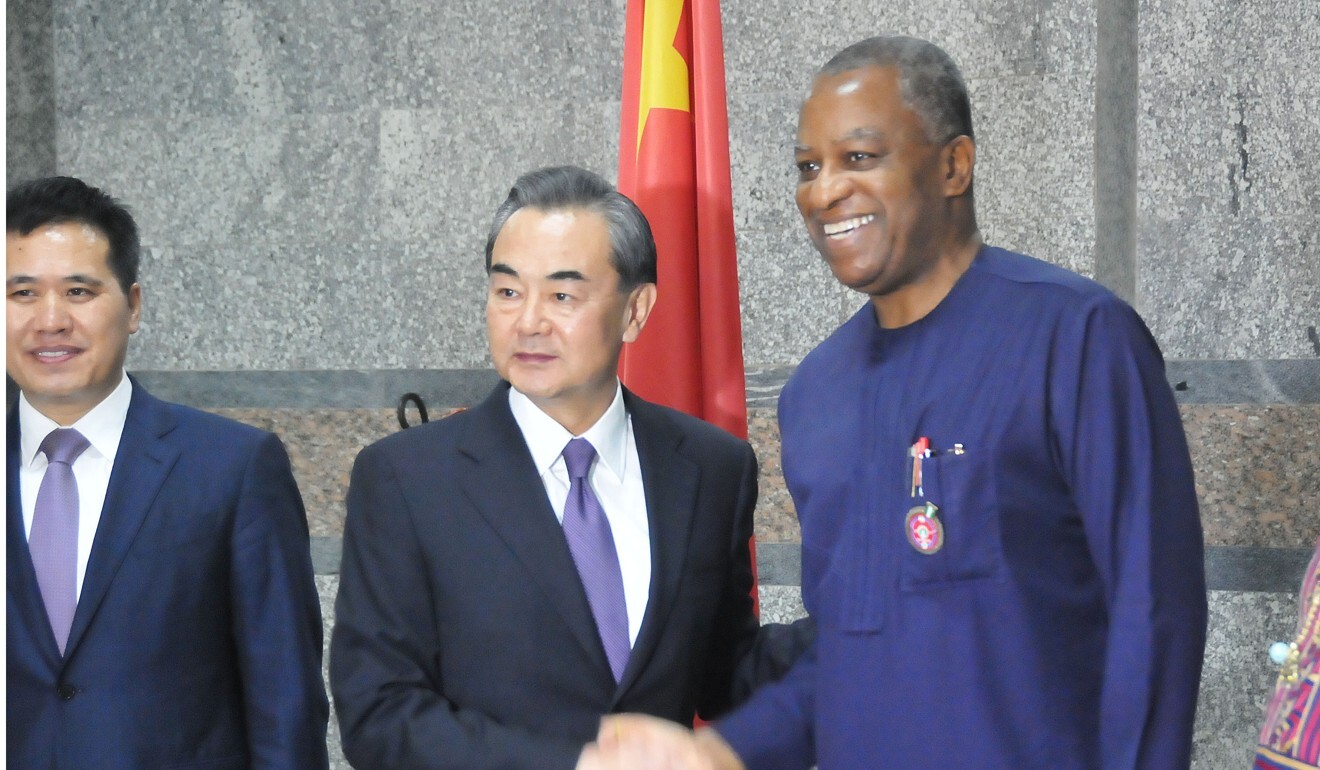China-Africa relations: Chinese foreign minister’s New Year trip still on despite coronavirus
- Broken economies, the Belt and Road Initiative and the roll-out of Covid-19 vaccines will be discussed during Wang Yi’s five-nation tour
- Putting Tanzania and Nigeria on the itinerary may help ease issues over Chinese infrastructure projects in those countries

When China’s Foreign Minister Wang Yi visited Africa at the start of 2020, there was a lot of optimism. For ever-improving China-Africa relations, for growth and for more Chinese funding for the Belt and Road Initiative, Chinese President Xi Jinping’s pet trade and infrastructure development plan which has funded the construction of highways, hydropower plants and railways across the African continent.
This was before coronavirus struck and destroyed economies, sending many African countries into debt distress.
Following China’s long-held tradition of foreign ministers making Africa their first trip of the year, Wang will spend this week on official visits to Nigeria, the Democratic Republic of Congo, Tanzania, Botswana and Seychelles.
But the trip will be unique. Wang is going to Africa at a time when the Covid-19 pandemic has pushed Sub-Saharan Africa into its first recession in 25 years. Many countries are facing financial crises and have applied for debt relief from the Group of 20 (G20) wealthy nations, including China.
Further, analysts foresee slowed lending for belt and road projects from Chinese policy banks Exim Bank of China and China Development Bank, which are now more cautious and have demanded proof of commercial viability before releasing funds for projects.
Chinese foreign ministry spokesman Wang Wenbin said on Wednesday the visit “demonstrates the high importance China attaches to its relationship with Africa”.
He added that China would support African countries in combating the virus and achieving economic recovery as well as advancing cooperation through the belt and road plan.
During his trip, Wang will exchange views with leaders of African countries about preparations for the next Forum on China-Africa Cooperation meeting to be held in Senegal later in the year.
Analysts say China’s vaccine diplomacy and the need to assure African countries that Beijing will continue to fund the continent’s infrastructure amid a debt crisis, will feature prominently during Wang’s visit.
Tim Zajontz, a research fellow at the Centre of African Studies at the University of Edinburgh, said the timing of the visit was not coincidental, occurring as discussions around the global distribution of Covid-19 vaccines were in full swing.
“The race for a coronavirus vaccine and its distribution in the Global South has become a geopolitical matter,” he said.
“For the Chinese government, the provision of a vaccine that is affordable and does not pose insurmountable logistical challenges is not only a humanitarian question but also an opportunity to flex its soft-power muscle in Africa.”
China’s vaccine diplomacy was set to become even more pronounced, as Western governments were likely to grab all available vaccines for months to come, he said.
“The Chinese government in turn has always emphasised the necessity to make a vaccine available to Africans as soon as possible.”
Stephen Chan, a professor of politics and international relations at the School of Oriental and African Studies, University of London, agreed that the visit “will certainly relate to China’s vaccine diplomacy but is also a snub to countries like Zimbabwe, long expecting Chinese help but without economic discipline”.
The trip to the five countries was “a signal to Sub-Saharan Africa as a whole that China is still in the game and that the trade war with the US has not dampened its commitment to Africa”.
Zajontz, who is also a research fellow in the Centre for International and Comparative Politics at Stellenbosch University in South Africa, said Wang’s visit affirmed China’s commitment to Africa amid the economic turmoil caused by the Covid-19 pandemic.
Resource-rich African economies, such as the Democratic Republic of Congo and Nigeria, were in particular highly dependent on Chinese demand for their post-coronavirus economic recovery, he said.

In Nigeria, Wang may use the opportunity to resolve a political uproar in the West African nation after lawmakers questioned a clause in a loan agreement signed with Exim Bank of China which talks about waiving immunity on grounds of sovereignty.
The legislators fear it exposes Nigeria to asset seizure if it defaults on its loans. The Nigerian lawmakers want loan terms and contracts with China renegotiated. China denied it had plans to use loans to seize strategic assets.
Zajontz said China would not want the Nigerian debate about indebtedness to China to affect Chinese investments in the Nigerian oil sector or to hamper access to Africa’s biggest consumer market.
“With crude oil prices still below US$50 per barrel, a post-corona recovery of the Nigerian economy is highly dependent on trade with and investment from China,” he said.
Wang’s visit to Tanzania might be seen as “another sign of a rapprochement between Beijing and Dodoma” after their economic relationship soured during President John Magufuli’s first term in office, Zajontz said.
In 2013, during his visit to Tanzania, Xi agreed to fund the US$10 billion Bagamoyo mega port and special economic zone.
But Magufuli suspended the projects amid disagreements over terms with China Merchants Holdings International, China’s biggest port operator.
Zajontz said Chinese involvement in several large-scale projects, such as Tanzania’s Standard Gauge Railway and the Bagamoyo project, fell victim to Magufuli’s rigid anti-corruption campaign and populist-nationalist economic policies.
“However, there are signs that China will play a more important role for Tanzania in Magufuli’s second term,” he said.
In mid-December, Xi called to congratulate Magufuli on his re-election. Magufuli said his country would work “enthusiastically” with China to build projects under the belt and road umbrella.
“Wang’s visit will therefore aim at winning the support of the Magufuli administration for Chinese investments in key sectors, such as infrastructure,” Zajontz said.
Botswana exports most of its raw materials, such as copper and coal, as well as its agricultural produce, especially meat products to China while Seychelles is a popular destination for Chinese tourists.